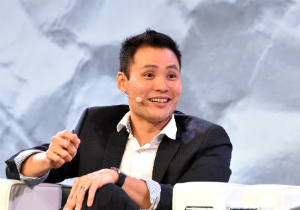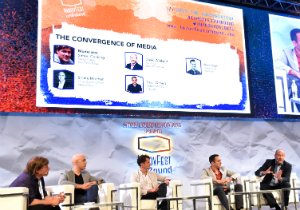A quick guide to what was discussed at two fintech and content panels during InnovFest unBound.
From blockchain tech impacting the finance industry to the transformation of the content ecosystem, speakers and panellists at the InnovFest Unbound 2016 conference gave their take on how technology is set to change the world. We bring you a taste of the interesting panels and presentations that were packed to the brim.
Kairos is no small Change
“Kairos” – the Greek word that Mr Benjamin Mah used to describe the current inflection point in the financial services industry.
It is, he said, “a time where everything is changing and something big is slated to happen”.

Mr Benjamin Mah, CEO of mobile identity authentication company V-Key: The real fight is not happening yet.
Mr Mah, Chief Executive Officer of mobile identity authentication company V-Key, was participating in a panel discussion on Fintech Tomorrow, and the conversation invariably turned to blockchain technology as a key catalyst for kairos.
Blockchain is a distributed database that maintains a continuously-growing list of blocks, each of which is time-stamped and contains information linking it to a previous block, making it virtually tamper-proof.
The technology heralds a new age for payments, said Mr Shailesh Naik, Founder and Chief Executive Officer of mobile payments company Matchmove Pay.
“There will be some consolidation in the payments industry, but it will be around mobile first, and digital authentication built around blockchain. Blockchain and distributed ledgers will level the field.”
Investors like Mr Dusan Stojanovic, Founder and Director of True Global Ventures, are also paying close attention to the technology. “Trades will be executed on blockchain. Payments, especially business-to-business payments, will be done over blockchain.”
The range of problems that can be solved with distributed ledgers goes way beyond the imagination, he said, likening the impact of blockchain to “a “new Internet”.
“And the timing is perfect because people are adopting it and innovating around it.”
Mr Naik believes that the opportunities for disruption are huge. “Anything that the bank is doing today is ripe for disruption and attack,” he said. “Customers' lives have moved to their mobile phones; they do not have to go back to the web site or ATM anymore.”
In Asia especially, there are many developments taking place that are unique to the region, such as social or peer-to-peer lending, he said. There are also many entrepreneurs here who are taking traditional financial services models onto the Internet and onto mobile.
However, the banks are not sitting still. “The real fight is not happening yet,” said Mr Mah. “Once the giant awakens, it will put in a lot of money and a lot of troops. The results are yet to be seen.”
Content and Convergence
Content is barely holding on to its crown.
Still important, yes, but it is no longer as important as it used to be, especially if nobody is listening to it or looking at it, said Mr Shaul Olmert, Founder and Chief Executive Officer of online content publishing platform company Playbuzz.
“It is about the platform. People discover content through Facebook, through Twitter. Publishers need to be able to curate content and ship them to these different platforms,” said Mr Olmert in a panel discussion on The Convergence of Media at InnovFest unBound.
For Mr Mike Kriak, Global Chief Operating Officer of Mashable, telling good stories is still a prerequisite.

Content in contention at The Convergence of Media panel at Smart Nation Innnovations InnovFest unBound.
But the company also needs to make sure that it has the ability to reach out to a wider audience, and that means working with a host of companies ranging from traditional media companies to newer OTT players.
For the more “traditional” media companies like the BBC, however, social media tends to be viewed more as a marketing tool than part of their business model.
However, that does not mean that the “dinosaur in the room” has been sitting still.
BBC is using Singapore as a launch pad for new digital initiatives such as delivering drama on demand, said Mr David Weiland, Executive Vice President Asia, BBC Worldwide. It will also be launching a BBC player that will give consumers access to channels and a download service that will allow them to download content watch offline.
Like BBC, Mediacorp regards social media more as a “promotional vehicle”.
“It helps consumers discover our content, said Mr Shane Mitchell, Chief Digital Officer, MediaCorp. “It is also a way for us to have a conversation with them.”
In his view, regardless of platform or channel or device, the glue that holds everything together is “big data”.
“We need to understand how the content is performing, and a big part of this is pulling insights from digital properties, from TV, radio, even from outdoor advertising.”
The aggregation of these insights will enable the company to have a better understanding of how content impacts advertising, and ultimately help it to create more compelling content that will help unlock advertising dollars, he said.


.webp)